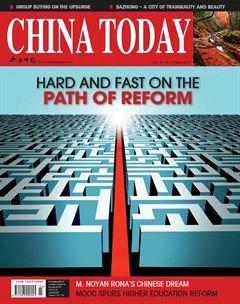On Chinese Media
South Reviews
Issue No. 2, 2014, published January 12
A Divided Countryside
Agricultural modernization is vital to Chinas drive towards urbanization and urban-rural integration. Policymakers and researchers are divided, however, about the development path and goals of the countrys rural areas.
Since the abolition of the agricultural tax in 2006, and also thanks to massive investment in the countryside and farming over recent years, Chinas rural areas have undergone a golden decade. However, some worrying problems still persist, such as farmer incomes still being far below those of city jobs, low technical levels among smallholders, some farmlands abandoned for part of the year, and a huge population of left-behind children and elders. One solution lies in largescale operation and agricultural modernization, through the introduction of higher inputs and accelerated land transfers.
Circumstances in rural communities vary greatly from region to region. For instance, conditions are ripe for those in northeastern and coastal provinces and in the exurbs of big cities to develop modern farming. In the countrys traditional breadbaskets – northern and central China and the central plains– farmer livelihoods are still a bigger concern than agricultural modernization. Such issues must therefore be carefully studied, to strike a balance between largescale farming and the demands of smallholders,
China Newsweek
Issue No. 2, published January 13, 2014
“Globalization” Reshuffle– Chinas Choices under the WTO Crisis
Since the World Trade Organization (WTO) replaced the General Agreement on Tariffs and Trade (GATT) in 1994, it has become one of the most important international economic organizations. However, in the last 10 or more years, the WTO has been constantly challenged by regional or bilateral free-trade agreements, with a tendency towards becoming marginalized.
For the WTO, meeting the different interest demands of over 100 member countries, going through different stages of development with diverse political systems, is apparently too steep a mountain to climb. In the last 19 years, global trade has not spurred world economic recovery, but has instead dragged the economy down. Meanwhile, more and more economies have turned to bilateral or regional trade negotiations.
The international community generally contends that China has been the biggest beneficiary of free trade in the early 21st century. Meanwhile China has also undergone the most trade relief investigations.
China should be more proactive in constructing various new international cooperative systems, and, on the basis of not resisting or challenging extant multilateral mechanisms, nurture and create new international cooperative platforms.
Oriental Outlook
Issue No. 3, 2014, published January 16
The Chinese Navys Nautical Chart
Last years open-sea drills by Chinas navy captured world attention. Many media outlets ran articles with such sensational headlines as, “First Island Chain Dismembered.” Meanwhile, they also noticed the increasing openness and transparency of the Chinese armed forces.
Despite the media hype, the exercises and training conducted by the Navy of the Chinese Peoples Liberation Army (PLAN) remain within the framework of Chinas conventional defense policy. Though there is now heated discussion about the Chinese navy entering the high seas and deep blue oceans, its focus is still on its own coastal areas and adjacent waters.
High-sea drills will eventually, however, become routine for the PLAN. Sailing farther into the briny blue demands not only larger ships but also better navigation and communication equipment and support by the air force, among other requirements. Over the past years, all the Chinese navy has done is lay a foundation for such missions, including building up its fleet, training soldiers and conducting drills. China is hence still a fledgling in all such aspects.
Life Week
Issue No. 5&6, published February 3, 2014
Love in Eden and Marriage in Real Life
Any narrative on love is challenged by social changes, and modified by different experiences. Michel Foucault therefore saw love as a subject of discourse. Even excluding historical processes from consideration, everyone has feelings and experiences different from others in the practice of love. Some meanwhile tend to examine and measure their own feelings against others stories.
Marriage and the family are experienced no more smoothly than love. Since divorce was permitted by law in European countries, after a level of political self-consciousness was established, with sexual liberation as a trendsetter of nouveau culture, the institution of marriage has undergone one crisis after another. To this day, marriage and family remain the most important mode of social life. As for marriage, this is seemingly a space that is constantly filled and transformed. Though laws have provided protection, it has become more and more limited, and increasingly concentrated on personal rights. Meanwhile, sociologists and psychologists find that marriage is becoming a self-governing field, increasingly dependent not on laws but on peoples expectations and practices of exploring and developing social life and personal relationships.

